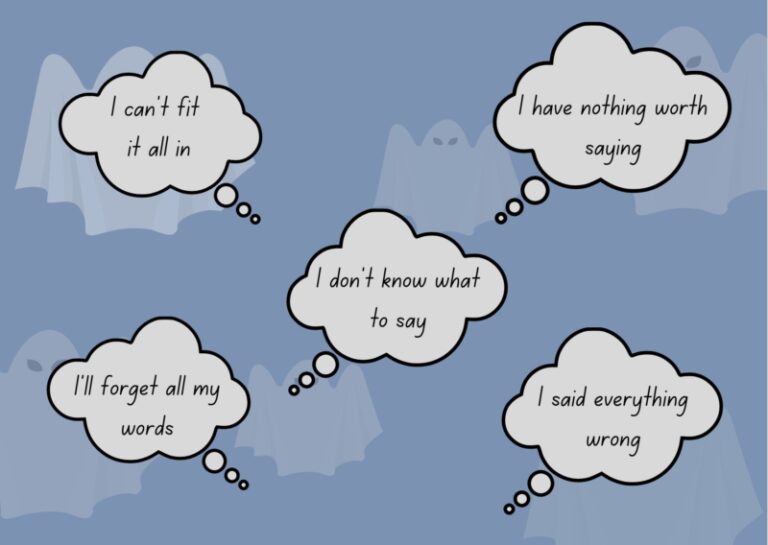Master four fundamentals to become a more confident speaker
If you are someone who struggles with a fear of public speaking you’re not alone. Someone has probably told you that you’ll become a more confident speaker with practice. If that isn’t working for you, or it’s not working fast enough, what can you do? From my experience there are four reasons that we struggle to become confident speakers, and it may not be what you think.
I’ve had my own battles and helped others through theirs. I’ve come to realise that public speaking anxiety rests on much more than developing a set of core skills. We can overcoming our anxiety by working on these four fundamentals
- creating a better relationship with our content
- improving our relationship with our role as speaker
- building a more supportive relationship with ourselves
- developing a better relationship with our audience
Importance of speech content
Like a lot of new speakers I started by feeling I had nothing worth saying and no clue how to say it. I wrote a script and spent time learning it word for word. When I came to deliver that script I failed; it was like words were popping up one by one on an invisible autocue and then came to an abrupt premature halt. I fluffed, I apologised, I stumbled and left deflated.

Don't put your script on a pedestal
Our relationship with our content isn’t about knowing a script, or even having one. Our relationship with our content is about believing that we have value to give and the right to be heard. It’s about understanding our core message well enough to deviate from any planned words without naming it a disaster. It’s about judging our performance on what the audience gained not by how closely we stuck to a script.
As my confidence grew I realised that I had put my script on a pedestal. My audience didn’t know or care what I had written down. If I was relaxed when point three came to me before point one I appeared more professional and in control.
Building confidence in your content
There are many techniques for working on your confidence in this area. Practise and training helps you develop your core message, but you can do more. If you struggle with the belief that you have something to say or the right to be heard try the following exercise. Get a large sheet of paper and write a heading of “20 reasons why I am awesome’. Write down as many things under that heading as you can. Review it and add to it daily.
How do I become a speaker?
“What do I do with my hands?”. I’d spent years speaking to my family, friends, colleges and shopkeepers but the moment I tried to put on a formal presentation I began to question how I stood, spoke, moved and where to put my hands. It’s not that we don’t have skills to work on; it’s the way we approach it that hinders us.

Is anyone a "born speaker"?
You might think that some people are born speakers and some are not, it’s certainly what I once thought. Now I’ve watched dozens of people become the speakers they thought they could not be; The idea of a born speaker doesn’t seem to be true. People say to me “I suppose you’ve always been a confident speaker”; they don’t know that I once considered resigning to avoid having to speak to five people. If we believe that others are born speakers it’s easy to believe we are not. I spent a lot of energy trying to look like a speaker as though I was putting on an ill fitting costume. It wasn’t until I got comfortable with thinking of myself as a speaker that I began to look like one.
Working on speaking skills
Improving our mindset is as important as improving our technical skills. You may think that you need to perfect your skills before you stop being an imposter but good speakers are continually looking to improve. Working on your skills is just part of being a speaker, understanding that is a major step to improving your relationship with your role as a speaker. When you believe in your role it brings a stage confidence that your audience can believe in.
There are many techniques to help you develop a better relationship with your role as a speaker. If you can practice within a supportive environment it’s a great start, but that can be massively boosted by using techniques such as visualisation.
I’m bad at public speaking!

Getting support as we develop
Those who develop fastest using the “feel the fear and do it anyway” approach do so because they use more positive self-talk when they prepare, speak and review their progress. People who give up, often give up because they don’t.
Being your own mentor
Improving my own self-talk was a turning point for me. I began to replace “that was awful” with statements like “Great, I was less nervous, next time I’ll work on my pace”. I knew I was a long way from perfection but I recognised my wins and gave myself reachable goals. Our internal dialogue is affected by how others treat us. If we are constantly put down we begin to internalise that, if we are supported then we start to replicate that. Regardless, we can still work on our relationship with ourselves.
Working on becoming our own best cheerleader and mentor is critical to develop as a speaker. It’s how you recover from setbacks and how you objectively identify what you need to work on and how. If you struggle with this work on bringing more positive people around you and use affirmations to support your progress.
Relating to your audience

Assumptions we make about our audience
Whether we know the individuals or not, we often need to work on our relationship with our audience as a whole. Every time I’ve compared myself negatively to my audience it’s hampered my performance. I know that if I spend my energy thinking about how I’m being judged then I’m unable to focus on delivering my content effectively. It’s just impossible to engage with people who we think are looking down on us, whether they are or not.
When our inbuilt relationship with our audience is unhealthy we make false assumptions. We assume that we have nothing to tell the experienced engineers yet they are looking for the perspective of a novice. We assume that the CEOs have nothing to learn from us, yet they are feeling disconnected from the shop floor. We assume that everyone is judging our speaking performance when half remember the efforts it took to speak that well and the rest are just dreading their turn.
Dealing with tough crowds
When you speak regularly to engaged and supportive rooms it does improve your general relationship with your audience, but some audiences are just a tough crowd. Your job may involve delivering unwanted information to a hostile audience which is never going to be easy. Try to remember that you are there to offer your unique knowledge and perspective rather than to be judged. Work on building a more healthy relationship with your audience using techniques such as affirmations and visualisations. Keep a list of quotes to hand that inspire you, you could start with the ones I shared in a previous blog.
Becoming that confident speaker.
Confidence comes in many forms. When we build our confidence as a speaker we need the confidence that gives us a healthy relationship with our content, our role as a speaker, ourselves and our audience. For most of us it may always be a work in progress, but strengthening these four pillars of confident speaking will make the journey much easier.


One Response